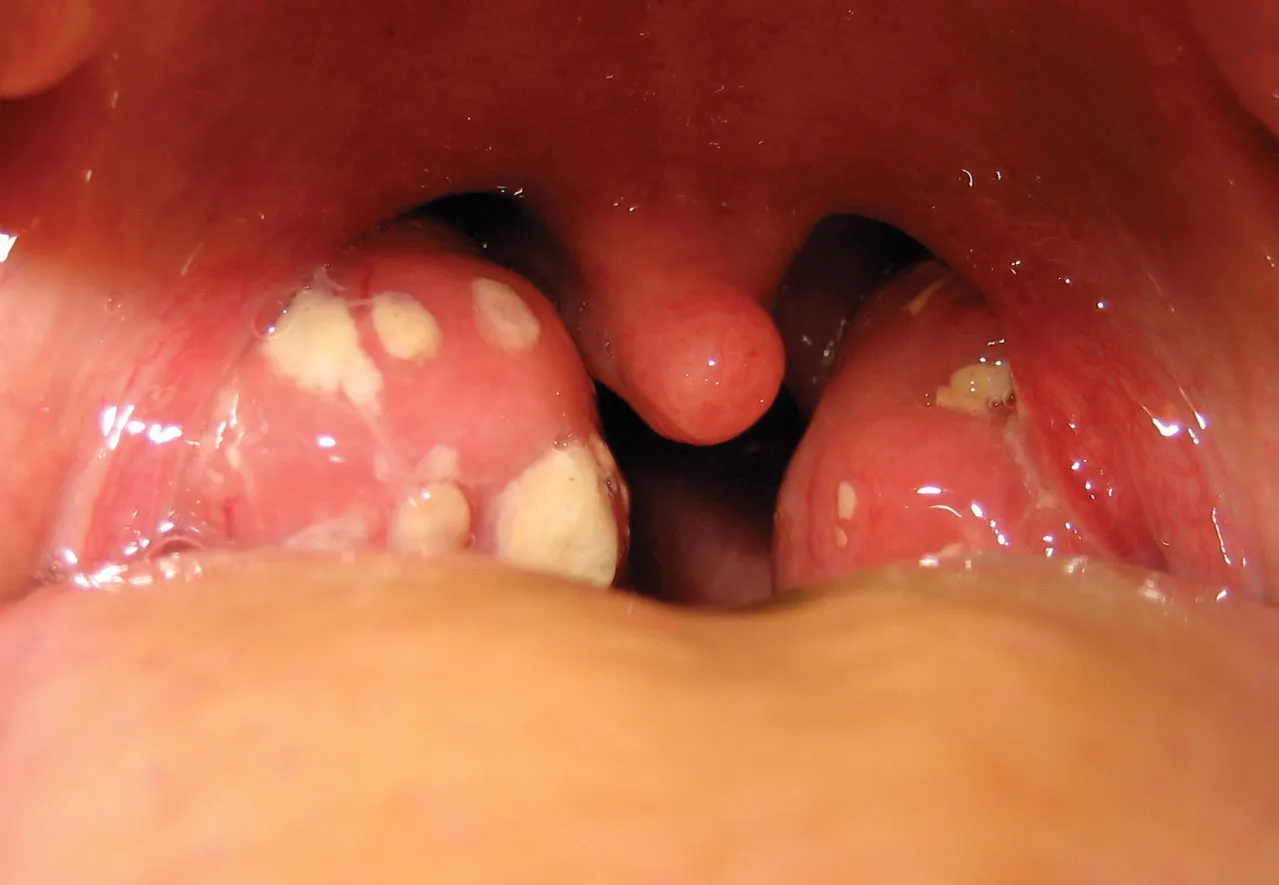Everyone has mucus, a “stringy gooey” substance that you blow into a tissue when you have a cold or sinusitis [1].
Mucus is a substance produced by the mucus-producing tissue in the blood vessels of our body and also in other parts of the body.
It is usually produced in the mouth, nose, throat, sinuses, and gastrointestinal tract [1].
Many people are not aware of the fact how important mucus is to our body. Mucus is a natural lubricant for the body.
It not only keeps tissue surfaces from drying and cracking, it also traps harmful invaders such as bacteria before they can enter the body [1].
Mucus only becomes bothersome when there’s too much of it, as it results in stuffy nose, itchy throat and difficulty in breathing [2].
These symptoms can signal a cold, allergy, or other viral or bacterial infections [3].
We have researched and created the following list of best natural remedies to expel excess mucus. These remedies are effective and have been proven by research. It is our utmost request for you to stay and read on.
So, in the following article, you will find:
- Home remedies for relieving excess mucus in chest and throat
- How to prepare these home remedies
- Directions and uses for these remedies to eliminate excess mucus
RELATED: 12 Essential Oils for Sinus Infection, Congestion, & Headaches
15 Home Remedies for relieving Mucus
1. Steam
Steam inhalation is said to be beneficial for people who have excessive mucus.
People believe that steam has a cleaning effect on the airways, and at the same time, it helps loosen and soften the mucus to make it easier to expel.
WebMD describes this natural method as a “simple way of relieving nasal congestion”.
An animal study done in 2010 reports that inhalation of steam can expel phlegm and relieve a cough [4].
Apart from being highly effective, this remedy is also very simple to put together.
If you don’t have a vaporizer, you can simply boil water, put it in a bowl, and inhale the steam.
Adding volatile compounds to the steam may also prove to be helpful, although researchers recommend further studies done on this matter [5].
Essential oils, for example, can facilitate quicker drainage of the mucus.
What You’ll Need:
- 5 drops of peppermint oil
- 1 teaspoon of almond oil
- 1 bowl of hot water
Recommended Directions:
- Combine the two oils.
- Apply the mixture to your throat.
- Take a steam shower.
- Or you can add peppermint oil to a bowl of hot water.
- Inhale the steam coming from the bowl.
- Do this twice a day for one week.
2. Peppermint Oil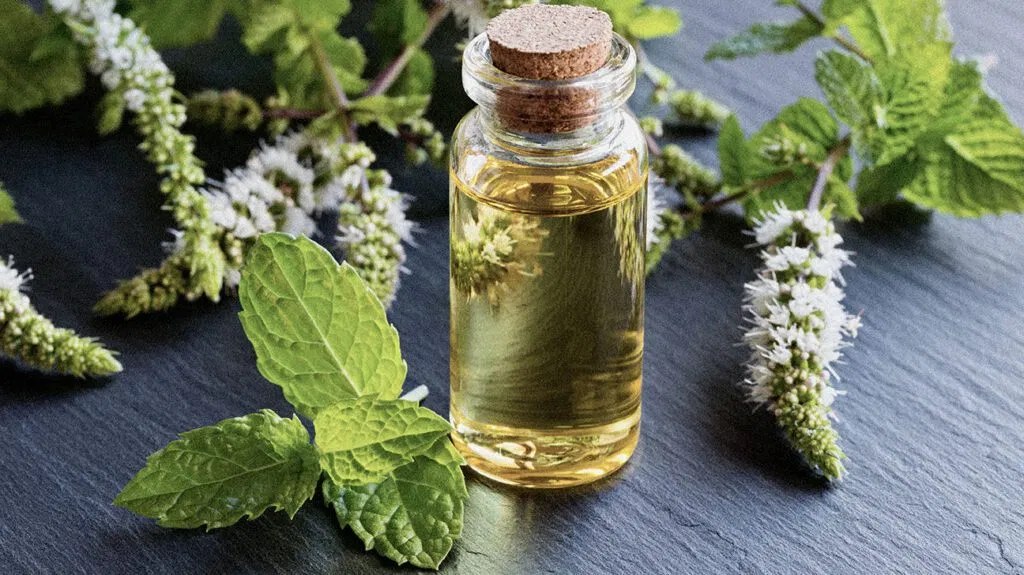
A cross between water mint and spearmint, peppermint is a plant that’s native to Europe but has been naturalized in Canada and northern parts of the United States [6].
It is most widely used as a flavoring agent for foods and fragrance for perfumes [6].
Its active compound called menthol benefits the respiratory tract by stimulating the cold receptors [7].
When you apply it to the throat area, you’ll feel a cooling sensation that immediately relieves congestion and makes you feel better.
In a clinical trial involving 62 subjects suffering from nasal congestion, half of the participants were given a lozenge with 11 mg of menthol while the other half received a placebo [7].
Results show that those who received menthol recovered more quickly compared to those who were in the placebo group [7].
It was reported that menthol can improve nasal airflow in as short as 10 minutes [7].
As if these aren’t enough, peppermint also demonstrates powerful antibacterial properties that can control harmful pathogens that cause excess production of mucus, as proven in various studies [8, 9, 10, 11, 12].
What You’ll Need:
- 20 drops of peppermint oil
- 1 bowl of hot water
Recommended Directions:
- Add peppermint oil to water.
- Inhale the steam from the bowl.
- Repeat several times a day until you feel better.
RELATED: 8 Reasons to Use Peppermint Oil for Hair
3. Anise Oil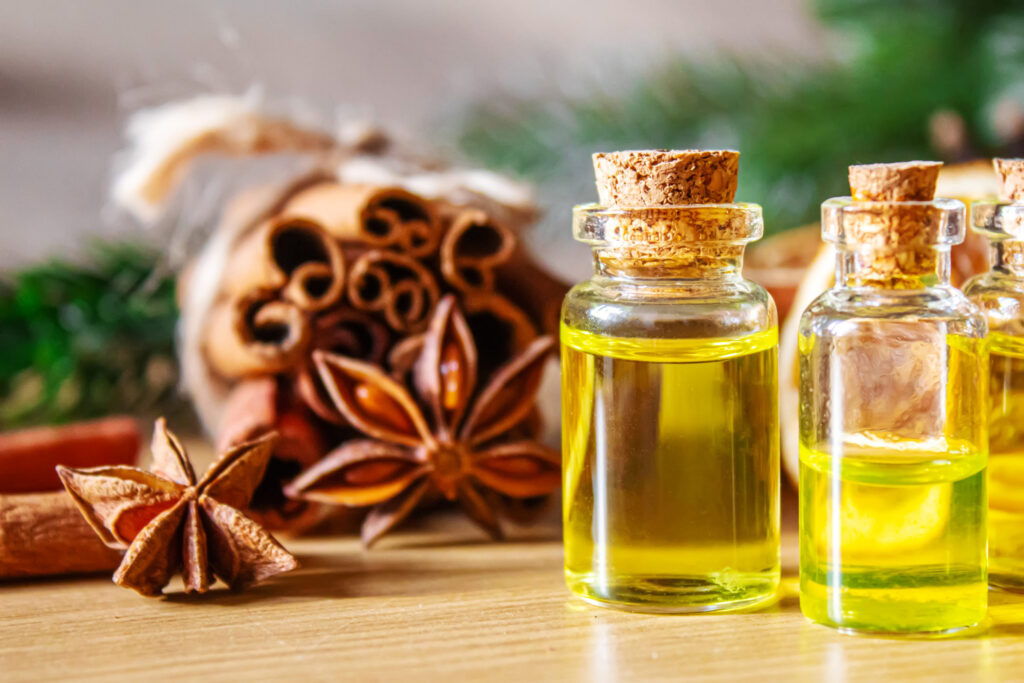
Arabs, Egyptians, Chinese, Greeks, and Romans were among the first to use anise as an herbal remedy during ancient times [13].
Today, it remains a go-to solution for many types of health problems, including excess mucus.
Anise is often used as an expectorant to expel phlegm and suppress a cough [13].
It is also a staple in aromatherapy to help alleviate difficulty in breathing caused by nasal congestion [13].
Inhalation of anise oil can also induce relaxation, which can help you a lot in cases when nasal congestion prevents you from getting a good night sleep [13].
As you know, it’s very important to get enough rest when you’re sick, as this will help you recover more quickly.
If not, the immune system will weaken even more, and it would become more difficult to combat the illness.
What You’ll Need:
- 10 drops of anise oil
- 2 cups of hot water
Recommended Directions:
- Add anise oil to hot water.
- Take in the steam.
- Do this remedy several times a day.
4. Salt Water
Cystic fibrosis is a condition characterized by an infection in the lungs and digestive system that can affect the production of mucus [14].
It makes the mucus “thick and sticky”, causing an obstruction in the passageways [15].
A study featured in The New England Journal of Medicine reveals that saline solution can help “restore mucus clearance and improve lung function” in patients suffering from this particular health problem [16].
A similar clinical trial performed by Australian researchers yielded the same positive results regarding the use of saltwater mixture for people with cystic fibrosis [17].
Even if you haven’t been diagnosed with cystic fibrosis, and you simply have a minor viral or bacterial infection, you can still make use of this remedy, which is very easy and simple to put together.
All you have to do is to gargle a mixture made with salt and water, and that’s it!
What You’ll Need:
- 1/4 teaspoon of salt
- 1 glass of warm water
Recommended Directions:
- Mix salt and water.
- Gargle the mixture.
- Repeat three to four times a day to eliminate mucus build-up in the lungs and throat fast.
RELATED: Himalayan Salt Lamp Benefits: 19 Reasons to Buy One
5. Ginger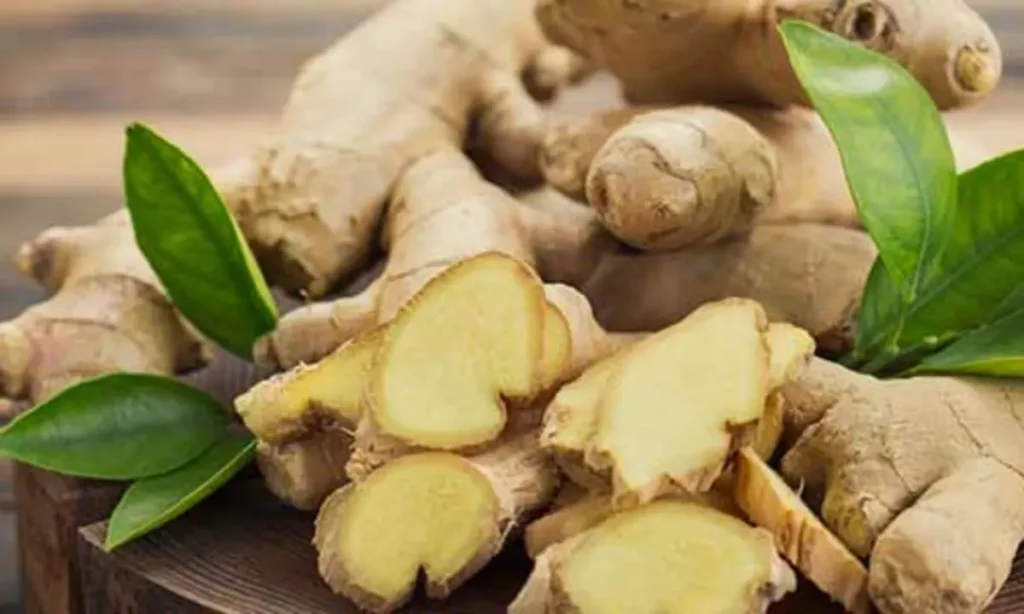
The antibacterial and antiviral properties of ginger have been demonstrated in several studies [18, 19].
This means, that it has the ability to control infections that cause increased production of mucus.
One such condition is asthma [20].
According to research conducted in 2015, the use of ginger as a treatment for respiratory disorders results in a significant reduction in airway inflammation [21].
It also works to alleviate nasal and vascular congestion in asthmatic patients [21].
While ginger is particularly useful for asthma conditions, you can also employ this remedy for other types of respiratory ailments that congest the nasal passages and make it hard for you to breathe comfortably.
Simply drink a tea made with grated ginger, and you’ll feel better after a short while.
What You’ll Need:
- 1 tablespoon of grated ginger
- 1 cup of hot water
- 1 teaspoon of honey
Recommended Directions:
- Steep ginger in water for 15 minutes.
- Add honey.
- Stir well.
- Drink the tea several times a day to get rid of green mucus.
RELATED: 20 Great Ways Of Using Ginger To Fight Your Acne
6. Honey
A cough, sinusitis, and other similar respiratory ailments also cause the body to produce more mucus.
It’s a good thing these conditions can be curbed with the use of honey.
Sinusitis sufferers experienced great relief after using honey for 30 days, reports a 2011 study [22].
Honey is also an excellent way to treat a cough and reduce mucus, thanks to its anti-phlegm actions [23, 24, 25].
In 2014, Nigerian scientists evaluated three randomized controlled trials involving more than 500 children to determine the efficacy of honey as a cough treatment [23].
The children were given cough medications, honey, or a placebo, while others were not given any treatment [23].
Findings reveal that honey effectively reduced the frequency and severity of a cough, and worked better than the placebo and the no treatment method [23].
Honey has also been shown to have similar efficacy as the medications commonly prescribed for this condition [23].
On top of all these, honey also boosts the body’s immune defense so that it can better fight off viral and bacterial infections that cause mucus overproduction [26].
Researchers conclude that honey is a cheap and excellent natural intervention for upper respiratory tract infections [23].
Take note that honey is not advisable for children under one year of age as it can increase the risk of infant botulism [23].
What You’ll Need:
- 1 tablespoon of honey
Recommended Directions:
- Consume honey twice a day for one month to get rid of throat mucus.
RELATED: How to Use Honey and Cinnamon for Cold
7. Turmeric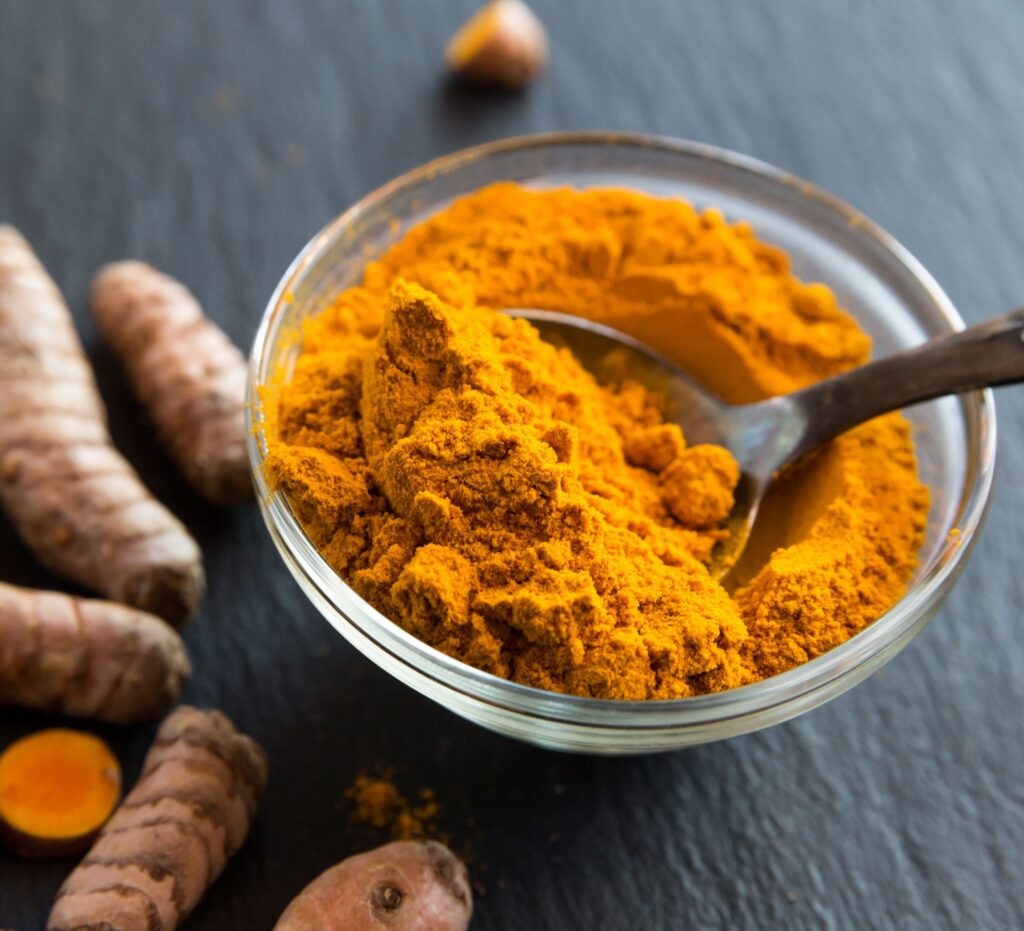
A popular medicinal rhizome, turmeric belongs to the Zingiberaceae plant family along with ginger [27].
Its yellow pigment comes from a compound called curcumin, which is also what’s responsible for many of its pharmacological properties [27].
For centuries, it has been widely used for treating numerous ailments including inflammatory diseases, fungal and viral infections, and even cancer [27].
For those suffering from excess mucus, turmeric can also provide immediate relief.
Scientific experiments suggest that turmeric powder is a good remedy for various respiratory diseases including cough and dyspnea [28].
These conditions have been known to cause increased production of mucus and impaired breathing respectively [28].
What You’ll Need:
- 1 teaspoon of turmeric
- 1 glass of hot milk
Recommended Directions:
- Add turmeric to milk.
- Drink in the morning, and before sleeping.
8. Echinacea
A team composed of scientists from Armenia, Sweden, and Germany investigated the effects of an herbal preparation that makes use of Echinacea as one of the ingredients in patients suffering from respiratory problems [29].
They discover that the Echinacea mixture reduced the frequency of coughing, alleviated nasal congestion, and improved the overall feeling of sickness [29].
It was also found that the medication enhanced the body’s ability to discharge mucus from the respiratory tract [29].
On top of these, Echinacea works to prevent as well as kill the source of many types of viral and bacterial diseases [30, 31, 32].
A 2010 study reports that Echinacea plants can efficiently inactivate different infection-causing viruses such as those that cause cold, flu, and rhinoviral infection [30].
It can also inhibit the activities of bacteria that cause a sore throat like Streptococcus pyogenes [30].
While getting to the root of the problem, this remedy also alleviates symptoms by reversing the pro-inflammatory response of the body [30].
In an extensive analysis of 24 double-blind trials that included more than 4,600 participants, Echinacea has been found to reduce the duration and severity of colds by 10 to 20 percent [31].
What You’ll Need:
- 1 cup of hot water
- 1 teaspoon of Echinacea
- 1 teaspoon of lemon juice
- 1 teaspoon of honey
Recommended Directions:
- Put herbs in a cup.
- Pour hot water into the cup.
- Steep for 15 minutes.
- Add lemon juice and honey.
- Mix well.
- Drink two to three times a day until symptoms improve.
9. Lemon Juice
Lemon juice is a popular household remedy for mucus chest congestion and a number of respiratory problems.
And it’s not hard to understand why.
Vitamin C in lemon juice has been proven many times as an effective way to treat the common cold, flu and other respiratory infections [33, 34].
In research done by American scientists, it was found that vitamin C in large doses can alleviate the symptoms of cold and flu by up to 85 percent [35].
One of the symptoms alleviated is excess mucus in the respiratory tract.
Since vitamin C is an effective immune booster, it can make the body more resistant to many kinds of viral and bacterial infections that cause overproduction of phlegm and mucus.
What You’ll Need:
- 1 tablespoon of freshly squeezed lemon juice
- 1 glass of warm water
Recommended Directions:
- Pour lemon juice into the glass of water.
- Drink solution three times a day for four weeks to treat mucus cough quickly.
RELATED: Lemon Juice for Acne: 8 Simple Home Remedies
10. Eucalyptus Oil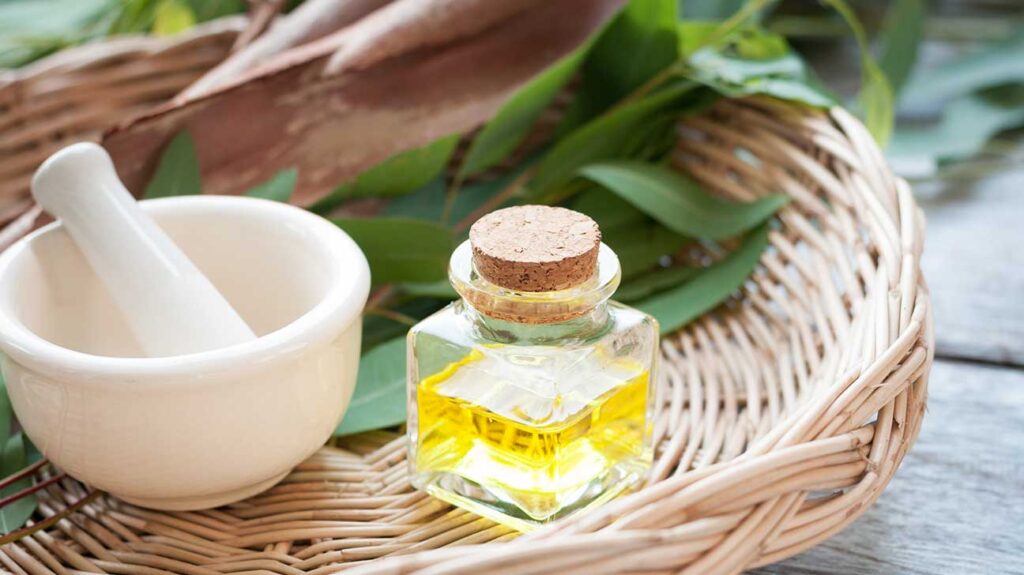
In Brazilian folk medicine, eucalyptus was used to treat colds, flu, and infections in the bronchial tubes [36].
Its wide range of medicinal benefits has been confirmed in scientific research [37, 38, 39].
A study published in the Respiration Journal found that inhalation of aromatic vapor such as from eucalyptus can improve airway function [40].
Researchers arrived at this conclusion after investigating the effects of eucalyptus and other aromatic oils on 24 non-smoking participants with common cold [40].
Eucalyptus can also alleviate symptoms of a common cold including difficulty in breathing due to excess mucus [40].
What You’ll Need:
- 1 teaspoon of eucalyptus oil
- 1 cup of water
Recommended Directions:
- Boil water in a pot.
- Remove from heat.
- Transfer water to a bowl.
- Add eucalyptus oil.
- Inhale the steam.
- Repeat three to four times a day.
11. Black Pepper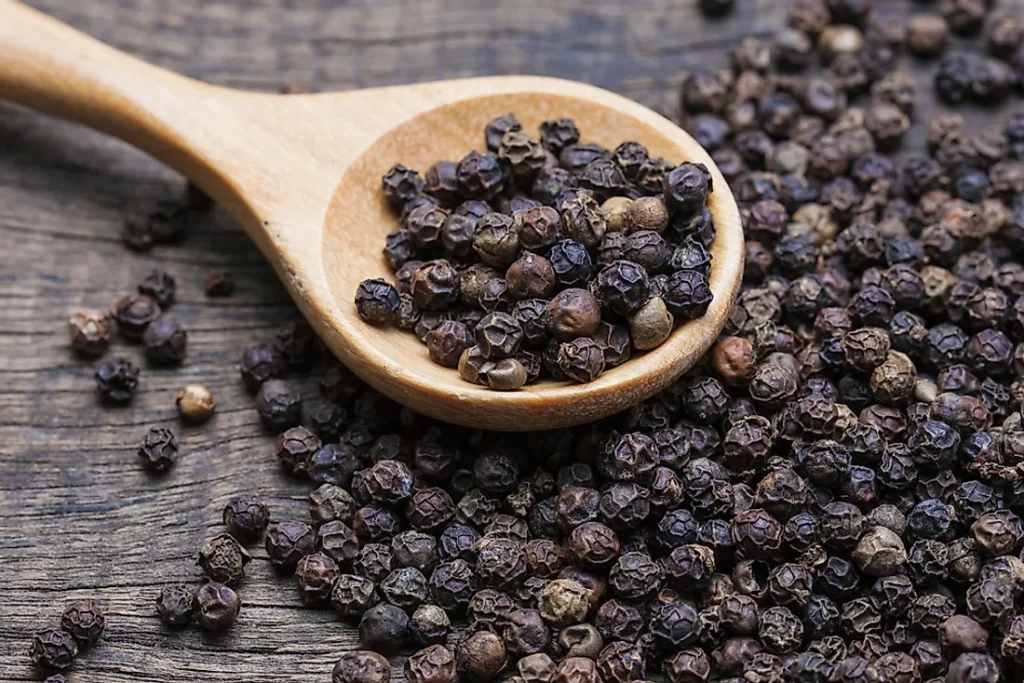
If you think that black pepper does nothing more than spice up your dishes or make you sneeze, then you’re wrong.
This highly medicinal spice can actually control an array of respiratory pathogens, according to a study conducted at the University of Karachi in Pakistan [41].
Since ancient times, it has been the go-to solution for asthma, sinusitis, cold, and nasal congestion, among others [41].
Scientific investigations show that pepper has strong antibacterial activity against bacteria that have grown resistant to penicillin and other antibiotics [41].
It shouldn’t come as a surprise that it’s also an easy and effective natural remedies for excess mucus.
What You’ll Need:
- 1/2 teaspoon of black pepper
- 1 tablespoon of honey
Recommended Directions:
- Put these two ingredients in a pan.
- Mix well.
- Warm the mixture for 30 seconds.
- Consume the mixture.
- Take this three times a day for one week.
RELATED: 10 No-Fail Home Remedies for Sinus Headaches & How to Use Them
12. Nutmeg Oil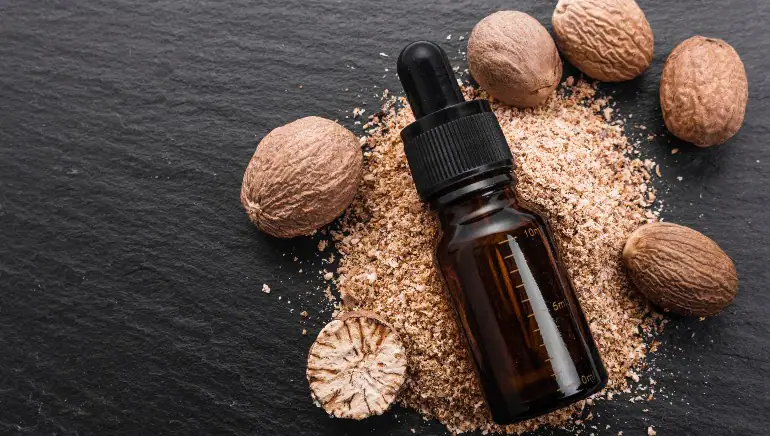
Here’s another way you can finally put an end to the problem of mucus: nutmeg oil.
In an experiment involving animal subjects, rabbits were made to inhale nutmeg oil [42].
Afterward, respiratory tract fluid was collected from each of the rabbits [42].
It was found that the higher the concentration of the nutmeg oil, the lesser the fluid was [42].
Researchers explain that the expectorant actions of this volatile oil can be attributed to the presence of camphene, which appears to have the ability to thin the mucus and expel it more efficiently [42].
What You’ll Need:
- 5 drops of nutmeg oil
- 1 bowl of water
Recommended Directions:
- Boil water in a pot.
- Remove from the stove.
- Pour water into a bowl.
- Stir in nutmeg oil drops.
- Inhale the steam coming from the bowl.
- Do this two to three times a day until the condition improves.
13. Apple Cider Vinegar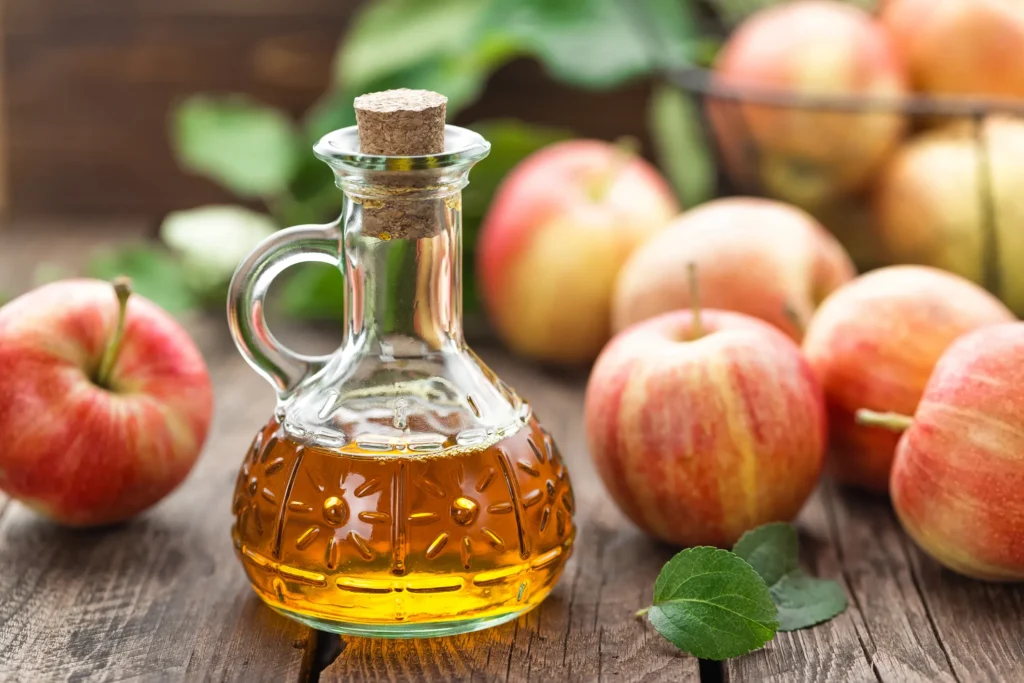
Apple cider vinegar or ACV has literally hundreds of uses in home remedies. Raw apple cider vinegar contains powerful antimicrobial and anti-inflammatory components.
The acetic acid and alcohol in ACV help to break up the accumulated phlegm or mucus in the respiratory tracts and relieves cold, flu, nasal congestion, sinus infection, and allergy symptoms. The high potassium value in ACV can inhibit runny nose and kill any harmful microorganisms responsible for mucus built up.
What You’ll Need:
- 1 tablespoon of the mother or raw ACV
- 1 teaspoon of honey
- 1 glass of warm water
Recommended Directions:
- Mix ACV with warm water.
- Additionally you can add 1 teaspoon of honey.
- Consume this drink thrice daily to dissolve and flush out mucus.
RELATED: How Effective is Apple Cider Vinegar for Ringworm Treatment?
14. Licorice Root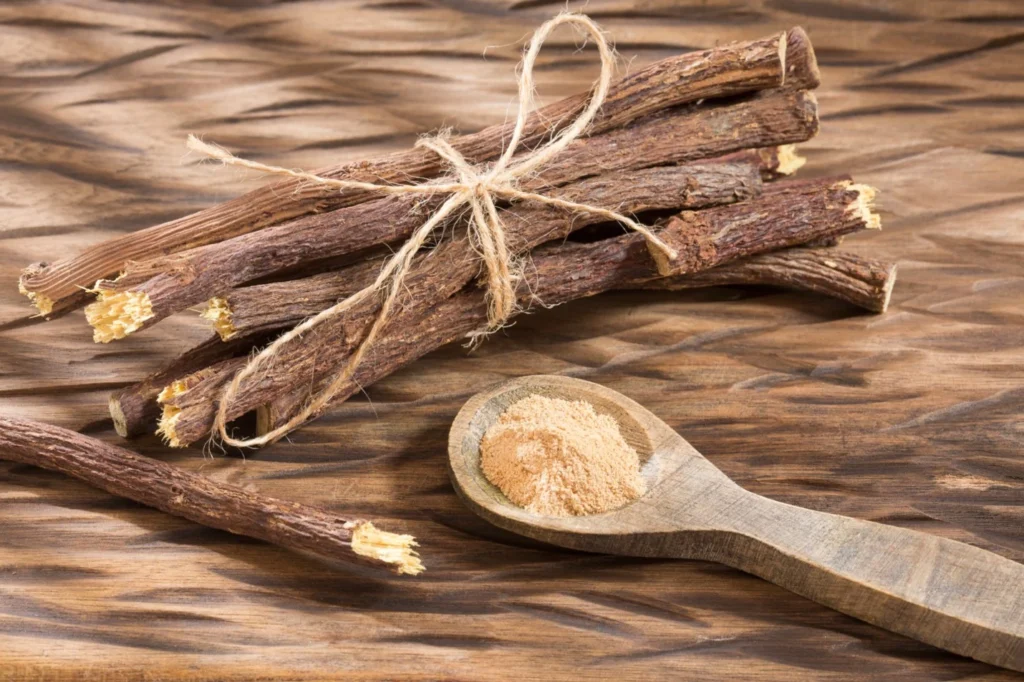
Licorice root or Glycyrrhiza glabra comes from the licorice plant, a herbaceous legume. The sweet-flavored root is a native of Asia and Southern Europe. Because the root extract is 30-50 times sweeter than sugar, licorice root is also called sweet root or candy.
Licorice root is an inseparable part of Chinese traditional medicine. A number of medical researchers in recent times have confirmed the strong anti-inflammatory effects of the root in curing a cold, flu, sinus infections, female reproductive issues, and leaky gut.
In the case of mucus built up, licorice root can help loosen and thin out the stubborn old phlegm and expel it out. The antiviral components of licorice root can inhibit the virus responsible for over of mucus production. You can use licorice root in combination with ginger, cayenne pepper, etc. to quicken the healing of cold and flu.
What You’ll Need:
- 1 teaspoon of licorice root powder
- ½ a teaspoon of grated ginger
- water
Recommended Directions:
- Boil a cup of water and add licorice powder and ginger to it.
- Allow the licorice to cool down and become mild warm.
- Consume this tea thrice daily.
RELATED: 11 Safe and Natural Home Remedies for Tonsilitis & How to Use Them
15. Chicken Soup
Who doesn’t love chicken soup? A bowl of warm chicken soup will also help with phlegm in your throat.
The warm soup moisturizes the airways and thins the consistency of the mucus. The soup can soothe an irritated throat as well.
Recommended Directions:
- You can take some chicken soup as many times as you want a day until your throat is clear of phlegm.
- To get better results, you might add ginger and garlic to the soup.
- This homemade soup can often be more efficient and soothing than store-bought, canned soup, which contains preservatives.
The Causes of Extra Amount of Mucus in Throat
As alarming as thick, sticky mucus is, it serves an essential function in the body. Mucous secretion lines the mouth, nose, sinuses, throat, lungs and digestive tube. [2]
These lines lubricate these surfaces while acting as a filter to get rid of unwanted substances before they enter the body.
This incredible slime also contains antibodies and enzymes that facilitate the body recognize and kill invaders like bacterium and viruses. [3]
But, as you know, you can have too much of a good thing, and mucus isn’t an exception. There are various triggers for excessive mucus build-up in the throat. They are:
Post-Nasal Drip: Post nasal drip happens when an excessive amount of mucous secretion in the nose and throat creates phlegm and causes coughing.
Mucus can build up in your throat overnight, that ends up in congestion in the morning. [4]
Seasonal Allergies: Some individuals suffer from seasonal allergies each year. Unlike the cold, the symptoms of seasonal allergies can occur all at once.
Some symptoms of the seasonal allergies are sneezing, coughing, itchy eyes, and of course throat mucus.
There are different types of allergens that cause these symptoms to occur, ranging from late winter to summer.
Tree and flower spore is one of the leading culprits of seasonal allergies, and also the symptoms can last till the allergens have dissipated. [5]
Cold or Flu: During a cold or influenza, you might notice a production of clear, thin secretion in the nose and back of your throat.
As soon as your body starts to react to the virus, the once thin secretion thickens and turns yellow or green. This condition is often the most noticeable symptoms of the cold or influenza virus. [6]
Foods: Sadly, some foods can cause throat mucous secretion, and if you are already handling throat phlegm, the very last thing you want to do is increase the problem.
Milk and milk merchandise like farm cheese and butter, cause excess mucous secretion in the throat.
These things contain casein, a protein molecule, that might increase secretions of mucus and is difficult to digest. [7]
Beside milk product, caffeine, sugar, salt, non-flavored teas, (especially black tea), all produce an excess amount of phlegm.
Soy is one of the most mucous secretion creating plant foods there is. People who quit meats and dairy and switch to soy products have a higher risk of creating an unhealthy mucous secretion build up within the body.
Pregnancy: Many ladies experience symptoms of nasal congestion, coughing and sneezing throughout pregnancy.
These symptoms are quite common and rank right along with backaches and nausea.
During pregnancy, the extra amount of estrogen creates phlegm production and cause the secretion to get thick or thin.
Some Q&A About Mucus
- What are excess mucus symptoms?
- Contrary to popular beliefs, mucus does not the only surface when you have a cold and flu. It can happen anytime. Excess mucus symptoms are:
- Congestion in the chest
- Coughing from the chest, especially very early in the morning every day
- A wet coughing every day
- Coughing with a “hacking” sound with mucus production
- The urge to “frequently” clear the throat
- More than usual amount of mucus in the nose and the sinuses
- What can cause the production of mucus?
- If you have certain types of allergies then it can cause your body to produce excess mucus. Even so, there are other environmental pollutants as well. These pollutants can actually stimulate your body to overproduce mucus. This includes:
- Exhaust fumes from cars
- Smoke from wood-burning
- Industrial exhaust
- Cigarette smoke
- Pet Fur
- Chemicals
Additionally, there are certain illnesses as well that can cause the production of excess mucus. These are:
- Emphysema
- Chronic bronchitis
- What to do if mucus changes color?
- Mucus changing color means that your body’s immune system is at work. Different color mucus means different antibodies in the body are actually working to fight the infection that is there in your body.
Things You Should Remember if You Have Mucus in Throat
- If you are suffering from mucus problems for more than 7 days, you might have a sinus or chest infection. In that case, it’s necessary to consult with your physician.
- Symptoms of an infection can include fever or a light-green or odorous secretion. If you run a temperature while you are suffering due to phlegm, it is time to see your doctor.
- Any time you see blood in the phlegm you cough up, you must seek medical attention.
- If you suffer from excessive phlegm frequently, you ought to make an appointment with your doctor.
Bottom Line
Mucus is an essential item in our body. But many of us want less of this thick, gluey, gooey stuff as it can hamper their day-to-day functioning.
So, when you have a cold or flu, mucus production must be controlled.
Don’t stress yourself out if you are producing excess mucus.
You can try the above home remedies for mucus.
These home remedies will give you the best results as they are effective and proven to get rid of mucus.
If you have other symptoms then get yourself checked by a doctor.
We really hope this article came to your help; if you have any questions or confusion regarding it feel free to ask us.
Also, don’t forget to share your experience with us by leaving your comments below.
READ MORE: 11 Quick-Acting Home Remedies for Pneumonia




